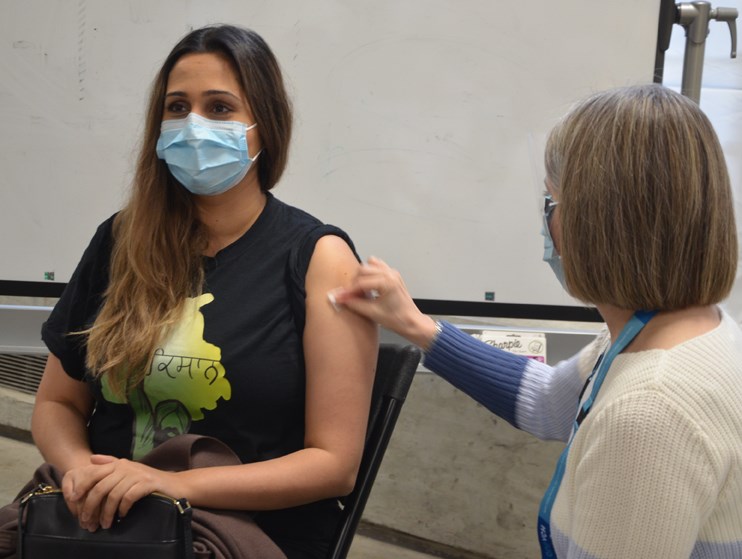The first COVID-19 vaccines have arrived on the North Shore.
Frontline health-care workers were lining up Tuesday morning to get their first dose of the Pfizer-BioNTech vaccine.
Amneet Mehat, a 31-year-old registered nurse who works in a long-term care home, was among the first to take the plunge.
More than protection against the virus, Mehat said the shot brings with it some feelings of relief.
“I think it’s going to be nice, even just for my family’s reassurance and for the reassurance of all the residents and the families of the residents that I work with that we’re protecting ourselves and continue to prevent the transmission of COVID,” she said. “It’s been scary. I don’t want to take it to anyone at work but I also don’t want to bring it home.”
The vaccine works by training the body’s immune system to recognize a specific protein on the coronavirus and attack it before the virus can replicate and make its host sick. Studies have found it to be about 95 per cent effective in preventing infections and the most likely side effects are temporary fatigue, pain or chills, which are sometimes associated with any vaccine.
When she returns to work, Mehat said she doesn’t expect much will change in terms of how she and other frontline workers will interact with the residents.
“I think we’re still going to keep the same protocols in place. It’s important still to keep following the rules until we’re given instructions otherwise,” she said,
Mehat said she had some nerves about being an early recipient of the brand new vaccine but she quickly got over it when thinking about the benefits it would bring.
Mehat said she’s not quite ready to give hugs to family members yet, but when the time comes, her elderly grandmother will be first in line.
As for what she makes of anti-vaxxers, Mehat offered a polite “no comment.”
The vaccines currently have to be administered at specialized sites equipped with ultra-low temperature freezers.
“This is a very delicate vaccine, and it’s very unstable once it’s been thawed and has to be used within a very short period of time. So those logistical constraints make it challenging,” said Dr. Bonnie Henry, the province’s medical health officer.
Because the vaccine can’t yet be transported to care homes, and comes in frozen trays of 975 doses that can’t be broken down, care workers who work in seniors homes are being vaccinated first at a central location on the North Shore.
Henry has said she’s hopeful Pfizer may loosen requirements for administering the vaccine in the coming weeks to allow health officials to transport it to care homes.
A second COVID-19 vaccine – the Moderna vaccine – has now been approved in the U.S. and is expected to get approval in Canada soon. Unlike the Pfizer vaccine, that vaccine does not require ultra-low temperature storage and will likely be the one that can be more readily distributed and administered inside care homes.
Henry said B.C. still does not have a schedule for receiving guaranteed amounts of the vaccine, but added that information is being updated constantly. She described the arrival of the vaccine in B.C. as a “momentous” step in fighting the pandemic.
Next in line after long-term care residents and staff will be the most elderly and frail and those in remote locations where health care services are less available.
It is likely that the vaccine won’t be available to the general population, including younger healthier people, until sometime this spring or summer, depending on how soon B.C. is able to receive vaccine supplies.
With files from Jane Seyd



